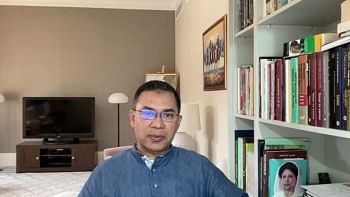Sink or swim: The need for water guardianship
Access to water for life is a basic human need and a fundamental human right. But leading experts now predict that as early as 2025, large parts of the world could experience perennial water shortages. Even now, around four billion people live in a situation where they don't have enough and suitable water for drinking, generating electricity, agriculture and so on. In fact, just as wars over oil played a major role in 20th-century history, many commentators are now making convincing cases that many 21st century conflicts will be fought over water.
With this rather grave background and with renewed sense of urgency the world is celebrating World Water Day with the theme 'Water and Sustainable Development.' Water is central to the sustainable development of our country, and something that we must all take responsibility for managing properly. As we celebrate World Water Day, we must look to empower communities as water guardians and establish strong national governance structures to protect and sustainably manage our precious water resources for the benefit of all!
In Bangladesh the crisis has some familiar faces. Water bodies such as rivers, canals, haors, etc. are increasingly being encroached upon. Various forms of pollutions and contamination due to industrial and agricultural chemicals, arsenic contamination, impacting etc. are limiting the supply of drinkable water. Additionally, salinity intrusion and water logging in the coastal regions are making the available supply of water unsuitable for many uses. On the other hand, the demand for water is increasing with industrialisation, intensive agricultural practices and population growth. As a result, demand for fresh water continues to outstrip supply, with the gap growing. If these challenges were not enough, the impact of climate change is set to complicate things further.
The good news is we can solve this. We can overcome adversity. With the Bangladeshi brand of resilience and innovation we can adopt new collaborative models from the grassroots right up to the national level authorities to address the challenge.
Communities can play an important role as local guardians in sustainable water management. National level enforcement agencies are incapable of monitoring and managing the challenge of water pollution, encroachment and salinity intrusion. In contrast, community level interventions have already established credibility. For example, after the oil spill in the Sundarbans in December last year, it was the people from the local area who were the first to respond, whose contributions in part assisted in avoiding a major environmental catastrophe. The Joint UN-GoB Mission recommended an action plan including community preparedness, highlighting appropriate safeguards and mitigation measures to prevent and prepare for oil spills in the Sundarbans and throughout Bangladesh for all significant marine routes.
To this end, empowering communities with the right tools and skills is a useful first step. Building local and regional networks of stakeholders including, community, local government, police and media is a holistic way to tackle the problem. This network can act as a watchdog to crowdsource water management at the grassroots and as a mechanism or conduit for communicating to the national level. Engagement of community organisations in such initiatives can follow the good practices learnt through UNDP's Urban Partnerships for Poverty Reduction programme and many other international examples of empowerment and participatory resource management.
Local level guardianship must also be supported nationally in a holistic and coordinated way. Having stronger institutional governance at the national scale would help in enforcement of existing laws that help to protect and manage the water resources of Bangladesh. There are three areas which would strongly support the national process, including addressing planning issues, developing an information management system and using community voices and research to inform decision making.
The master and local plans for water management should be revisited with public participation encouraged in the review and revision process. Starting this process will ensure integrity, coordination, and efficiency of the plans, whilst also improving accountability issues associated with their implementation. This will help to keep powerful vested interests in check, and develop an information system that is both a repository of water related information (such as public documents on river boundaries, water related public investments, water quality data) and a platform for crowdsourced reporting of violations. Such a tool will increase transparency, improve enforcement of existing laws and create greater equity of water resource distribution and access.
The third step is the establishment of an informed decision making process. There should be an independent experts' platform, like that responsible for the 7th Five Year Plan, constituted by the government. This platform should be made up of all the key water actors including the Ministry of Water Resources, Department of Public Health Engineering, City Wasa, Bangladesh Inland Water Transport Authority, Water Resource Planning Organisation, and the private sector amongst many others. This coordination mechanism of local and national level guardianship must be driven by a result-oriented management structure, in order to deliver the urgent changes needed in the water sector. To support this approach, a recent study compared the water governance and management systems across nearly 30 river basins around the world. The results indicated that governance systems with distributed political power and good co-ordination help to implement the principles of good governance in water management practice.
With a federation of regional community organisations helping to raise local voices to the national level, and stronger institutional governance and national guardianship, protection and management of the water resources of Bangladesh can be achieved, promoting sustainable development for all. Working together, Bangladeshis can accomplish anything.
The writer is the Senior Advisor, Sustainable Development at UNDP Bangladesh. (Opinion expressed, is his own and may not be subscribed by UNDP or any of the member states that it represents.)
*(Human Development Report 2006).


 For all latest news, follow The Daily Star's Google News channel.
For all latest news, follow The Daily Star's Google News channel. 



Comments